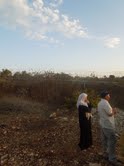Category: Journals
-
Call from Gaza to the citizens of the world: STOP THE ONGOING MASSACRE
18.11.2012 – Besieged Gaza, Occupied Palestine Four years after the Israeli Occupation Forces perpetrated a massacre upon the population of Gaza, Apartheid Israel commits another crime. The latest round of Israeli war crimes has resulted in a new massacre ; at the time of writing more than 40 innocent civilians, including 15 children, have been…
-
Letter from ISM activist in Gaza
14th November 2012 | International Solidarity Movement, Gaza Strip Dear All. I am calling on all your support for the besieged people of the Gaza Strip. Here in Gaza, more than 10 people have been killed so far in the Israeli operation named “Pillar of Defence” within the last 7 hours, including countless children such…
-
Picking olives in a cage
Journal by Ellie Marton 25 October 2012 | International Solidarity Movement, West Bank I spent Tuesday inside a cage. Not my usual way to spend a sunny Tuesday – but for the Palestinian farmers I was with, this is routine. This is because their land happens to be near the illegal Israeli settlement of…


